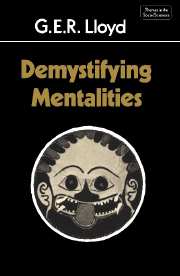Book contents
- Frontmatter
- Contents
- Note on texts and references
- Acknowledgements
- Introduction
- 1 Mentalities, metaphors and the foundations of science
- 2 Magic and science, ancient and modern
- 3 The conception and practice of proof
- 4 A test case: China and Greece, comparisons and contrasts
- Conclusion: mentalities demystified
- Notes
- Bibliography
- Index
1 - Mentalities, metaphors and the foundations of science
Published online by Cambridge University Press: 07 January 2010
- Frontmatter
- Contents
- Note on texts and references
- Acknowledgements
- Introduction
- 1 Mentalities, metaphors and the foundations of science
- 2 Magic and science, ancient and modern
- 3 The conception and practice of proof
- 4 A test case: China and Greece, comparisons and contrasts
- Conclusion: mentalities demystified
- Notes
- Bibliography
- Index
Summary
Two of the contexts in which the notion of mentalities has been invoked are (1) in connection with understanding some apparently extravagantly paradoxical or counter-intuitive statements reported in the ethnographic literature as in such famous cases as that of the Nuer belief that ‘twins are birds’, and (2) the general contrast between the scientific and the prescientific. The aim of my first investigation is to tackle some aspects of these issues as they relate to ancient Greek thought with a view to testing how far the concept of distinct mentalities is needed or appropriate. I do not, of course, assume that Greek thought or Greek society bears specific resemblances to those of the Nuer or indeed of any present-day society, though by that I do not mean, either, to claim special, unique status for the Greeks as has been done so often in the past by classicists for whom ‘les Grecs ne sont pas comme les autres’ (cf. the critical remarks of Detienne 1979, ch. 1) let alone by those such as Renan who fantasised over what they thought of as a ‘Greek miracle’ (Renan 1935, pp. 243ff, 1948, p. 393, cf Peyre 1973). But while the notion of mentalities originated as an ethnographic problem, it is, as we have noted, of very general applicability and concerns the historian, the psychologist and the philosopher of science as much as the social anthropologist.
- Type
- Chapter
- Information
- Demystifying Mentalities , pp. 14 - 38Publisher: Cambridge University PressPrint publication year: 1990
- 1
- Cited by



